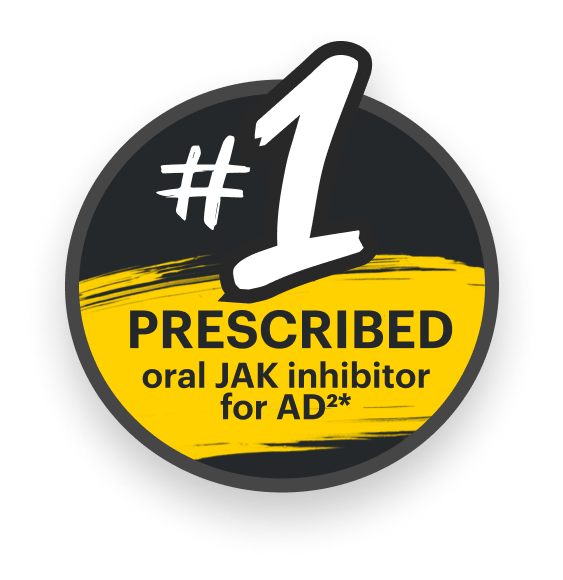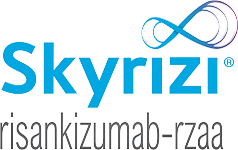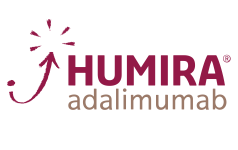*As of 9/2023. Source: Integrated Symphony Health (PatientSource) and IQVIA (NSP).
ONE PILL,
ONCE DAILY1

*As of 2/2024. Source: Integrated Symphony Health (PatientSource) and IQVIA (NSIP).
INDICATION
RINVOQ is indicated for the treatment of adults and pediatric patients 12 years of age and older with refractory, moderate to severe atopic dermatitis whose disease is not adequately controlled with other systemic drug products, including biologics, or when use of those therapies are inadvisable.
Limitations of Use: RINVOQ is not recommended for use in combination with other JAK inhibitors, biologic immunomodulators, or with other immunosuppressants.
Initiation1
- For patients 12+ weighing at least 88 lb (40 kg), initiate therapy with 15 mg once daily
- For patients ≥65 years of age, patients receiving strong CYP3A4 inhibitors, and patients with severe renal impairment (eGFR 15 to <30 mL/min/1.73 m2), the recommended dose of RINVOQ is 15 mg once daily
- RINVOQ is not recommended for use in patients with end-stage renal disease (eGFR <15 mL/min/1.73 m²), severe hepatic impairment (Child-Pugh C), or those receiving strong CYP3A4 inducers
- RINVOQ initiation is not recommended in patients with an absolute lymphocyte count (ALC) <500 cells/mm3, absolute neutrophil count (ANC) <1,000 cells/mm3, or hemoglobin level <8 g/dL
Treatment1
For patients 12 to <65 years of age weighing at least 88 lb (40 kg):
- If an adequate response is not achieved, consider increasing dosage to 30 mg once daily
- Discontinue RINVOQ if an adequate response is not achieved with the 30 mg dose
- Use the lowest effective dose needed to maintain response
Administration1
- RINVOQ tablets should be taken orally with or without food
- Advise patients to avoid food or drink containing grapefruit during treatment with RINVOQ
- RINVOQ is an extended-release tablet, do not split, crush, or chew. Ensure tablet is swallowed whole
Medication Residue in Stool1
- Instruct patients to notify their healthcare provider if they repeatedly notice intact RINVOQ tablet or fragments in stool or ostomy output
Considerations1
- RINVOQ treatment should be interrupted if a patient develops a serious infection until the infection is controlled
- Interruption of dosing may be needed for management of laboratory abnormalities. See monitoring and treatment considerations below
AD=atopic dermatitis; CYP3A4=cytochrome P450 3A4; eGFR=estimated glomerular filtration rate; JAK=Janus kinase; NDC=National Drug Code.
Please see Important Safety Information, including BOXED WARNING on Serious Infections, Mortality, Malignancies, Major Adverse Cardiovascular Events, and Thrombosis, below.
Lab monitoring
Perform lab tests at baseline,* at 12 weeks,† and periodically thereafter1,3
Treatment should NOT be
INITIATED or CONTINUED if:
| Laboratory Value | Treatment should NOT be INITIATED or CONTINUED if: | |
|---|---|---|
CBC Differential
|
Neutrophils | <1,000 cells/mm3 |
| Lymphocytes | <500 cells/mm3 | |
| Hemoglobin | <8 g/dL | |
| Liver enzymes | Elevated liver enzymes and suspected drug-induced injury | |
| Lipids | — | |
*USPI recommendation for CBC and liver enzymes: at baseline and periodically thereafter.
†USPI recommendation for lipids: at 12 weeks and thereafter according to hyperlipidemia guidelines.
Treatment may be restarted when blood levels return to acceptable values seen in chart above, drug-induced liver diagnosis is excluded or infection is controlled.1
RINVOQ is not recommended for use in patients with severe hepatic impairment or end-stage renal disease.1
Discontinue RINVOQ in patients who have experienced a myocardial infarction or stroke.1
Avoid RINVOQ in patients who may be at increased risk of thrombosis.1
Treatment may be restarted when blood levels return to acceptable values seen in chart above, drug-induced liver diagnosis is excluded or infection is controlled.1
RINVOQ is not recommended for use in patients with severe hepatic impairment or end-stage renal disease.1
Discontinue RINVOQ in patients who have experienced a myocardial infarction or stroke.1
Avoid RINVOQ in patients who may be at increased risk of thrombosis.1
CBC=complete blood count; TB=tuberculosis; USPI=US prescribing information.
Baseline screening1
At baseline and periodically, screen for:
SERIOUS INFECTIONS
Closely monitor patients for the development of signs and symptoms of infection during and after treatment with RINVOQ. Interrupt RINVOQ if a patient develops a serious or opportunistic infection.1
TUBERCULOSIS
Monitor patients for the development of signs and symptoms of TB, including patients who tested negative for latent TB infection prior to initiating therapy.1
VIRAL REACTIVATION
Screening for viral hepatitis and monitoring for reactivation should be performed in accordance with clinical guidelines before starting and during therapy with RINVOQ.1
PREGNANCY
Based on animal studies, RINVOQ may cause embryo-fetal toxicity when administered to pregnant women. Verify pregnancy status prior to starting treatment. Advise women to use effective contraception during and for 4 weeks after completion of treatment.1
VACCINATIONS
Avoid use of live vaccines during, or immediately prior to, RINVOQ therapy. Prior to initiating RINVOQ, it is recommended that patients be brought up to date with all immunizations, including prophylactic varicella zoster or herpes zoster vaccinations, in agreement with current immunization guidelines.1
~99% of patients did not experience a treatment interruption due to lab changes
Lab abnormalities: placebo-controlled period through 16 weeks1,4,5
<<Swipe table to see more
| All Subjects‡ | ||||
|---|---|---|---|---|
| Lab Abnormality | Placebo (n=902) |
RINVOQ 15 mg (n=899) |
RINVOQ 30 mg (n=906) |
|
| Absolute neutrophil count | <1,000 cells/μL | 0% | 0.4% | 1.3% |
| Absolute lymphocyte count | < 500 cells/μL | 0.1% | 0.1% | 0.3% |
| Hemoglobin | <8 g/dL | 0% | 0% | 0.1% |
| Liver transaminases | ALT ≥3 x ULN AST ≥3 x ULN |
1.1% 0.9% |
0.7% 1.2% |
1.4% 1.1% |
| Lipids | LDL-C elevation (mean change from baseline) HDL-C elevation (mean changes from baseline) |
1.68 mg/dL 1.22 mg/dL |
8.09 mg/dL 7.11 mg/dL |
13.35 mg/dL 9.35 mg/dL |
‡Includes subjects from M16-048, MEASURE UP 1, MEASURE UP 2, and AD UP.4
ALC=absolute lymphocyte count; ALT=alanine aminotransferase; AST=aspartate transaminase; ANC=absolute neutrophil count; HDL-C=high-density lipoprotein cholesterol; Hgb=hemoglobin; LDL-C=low-density lipoprotein cholesterol; LFT=liver function test; ULN=upper limit of normal.
Lab changes (ANC, ALC, Hgb, LFT) occurred within the first 4-8 weeks, were transient, and generally returned to baseline levels within the normal range without study drug discontinuation.4-6




